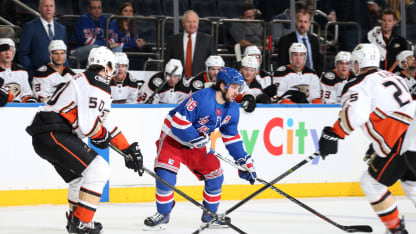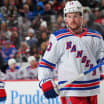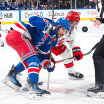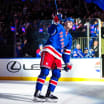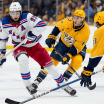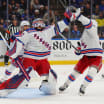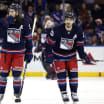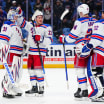"The key to success is everybody buying in and doing whatever's asked of you to do for 60 minutes. And lately, we haven't had that - it's been periodically, it's been long stretches at a time, and then long stretches where we don't do it," Quinn said. "That's something we talked about a lot today. You can trust each other when you're supposed to be someplace and you know the other four guys are going to be in another place. The game becomes very easy when there's that reliability and being a good teammate."
With the Rangers losing Kevin Shattenkirk (separated shoulder) and Jesper Fast (upper body) in back-to-back games last week, they have undoubtedly been given a lift by the returns of Pavel Buchnevich and Mats Zuccarello. Buchnevich has points in the last five games he has played in, including each of his two games since returning from a 13-game absence to a broken thumb.
Buchnevich and his head coach spent some time during Monday's practice working on the side and at the whiteboard, and while Quinn said there has been "just a little bit" of that side work with Buchnevich, he has been growing increasingly impressed with the 23-year winger this season.
"He's really made great strides, he's played really well since he's come back," Quinn said. "Really coachable and asking questions. I really like his approach.
"I'm surprised how well he's playing (after a long layoff) - I think Zuc's played well too. It's a testament to them, I think they both really worked when they were out, so I think they were probably a little bit more game-ready than most people because of how hard they both worked."
Buchnevich played a primary role in each of the Rangers' early goals in the two games of this homestand: He scored on a power play 4:01 into his return from injury on Friday against Arizona, then set up Skjei for a slam dunk off a rush just 1:13 in against Vegas.
The Rangers have opened the scoring in each of their last five games, and six straight at home.
"I had a chance to jump into the play, and then skill took over from Buch," Skjei said on Monday. "He's good at threading those passes over sticks. I had a wide-open net - if I would've missed that it would've been tough.
"It was a good feeling, a good way to start the game. But you've got to keep playing well and keep making plays after that."
Quinn acknowledged that some of what the Rangers struggled with on Sunday is going to befall any team over the course of an 82-game season. "If you look across the league, our league can be very streaky for most teams," he said. "If you're going to dig yourself out of a hole, that's really where you've got to get back to the basics, you need to get back to the blocking and tackling and the simplicity of our game. Part of that is physical, but a big part of that is mental."
On the subject of streaky teams, take the Ducks. When the Rangers last saw them roughly six weeks ago in Anaheim, the Ducks came into the game on a six-game losing streak (the Rangers would push it to seven with the shootout victory) and were mired in the early-season basement of the Western Conference. On Tuesday they come into the Garden having won six straight road games and 11 of their last 13 overall (11-2-0), and leading the Pacific Division.
Anaheim is 2-0 on its current stretch of six straight road games, the latest a 4-2 win in Pittsburgh on Monday night. The Ducks have been masters of the comeback lately: Monday's win was the first time in their last 10 victories in which they led the entire way in the third period - though they trailed 2-0 after one period before scoring the last four unanswered. Ryan Getzlaf's assist on Ondrej Kase's second-period winner, plus his third-period empty-netter, upped the Anaheim captain's team-leading points total to 28 (9-19-28), while Josh Gibson made 28 saves for his 15th win, tied for third in the NHL.
